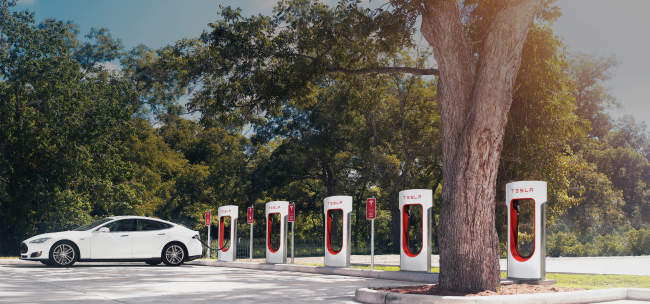Tesla Korea is ramping up efforts to take over the local electric vehicle market, expanding its supercharger network here.
The electric carmaker will open its eighth supercharger station at Lotte World Tower in Jamsil, southeastern Seoul this month and complete building six more by the end of the year, the company said Sunday.
With six more superchargers to be established nationwide, including Yongsan in Seoul, Pangyo in Gyeonggi Province and Seogwipo on Jeju Island, the total number of supercharger stations here will total 14 by the year’s end.
It takes about 75 minutes to fully charge Tesla vehicles with a supercharger, compared to over 10 hours using Tesla’s 7-kilowatt-home chargers. A supercharger station can charge about six to eight Tesla vehicles at a time.
Tesla’s latest efforts came as the Ministry of Environment approved Tesla Model S 90D sedans for government subsidies last month. Subsidies range from 3 million won ($2,619) to 12 million won.
The government has yet to decide on Tesla Model S 75D and Model S 100D for subsidies.
The electric carmaker will open its eighth supercharger station at Lotte World Tower in Jamsil, southeastern Seoul this month and complete building six more by the end of the year, the company said Sunday.
With six more superchargers to be established nationwide, including Yongsan in Seoul, Pangyo in Gyeonggi Province and Seogwipo on Jeju Island, the total number of supercharger stations here will total 14 by the year’s end.
It takes about 75 minutes to fully charge Tesla vehicles with a supercharger, compared to over 10 hours using Tesla’s 7-kilowatt-home chargers. A supercharger station can charge about six to eight Tesla vehicles at a time.
Tesla’s latest efforts came as the Ministry of Environment approved Tesla Model S 90D sedans for government subsidies last month. Subsidies range from 3 million won ($2,619) to 12 million won.
The government has yet to decide on Tesla Model S 75D and Model S 100D for subsidies.

“Despite high expectations for the iconic electric car maker that started service here in March this year, Tesla has so far posted sluggish sales largely due to high price tags of more than 100 million won,” said Kim Pil-soo, an automotive engineering professor at Daelim University.
The price of a Tesla Model S 90D has dropped below the 100 million mark to some 90 million won due to eased regulations made in July.
A total 48 units of Tesla models were newly registered in Korea as of late August since the carmaker started deliveries here in June, according to data by the Ministry of Land, Infrastructure and Transport.
At this rate, about 120 units of Tesla EVs will be registered until the end of year.
Demand for Tesla models, however, is projected to rise on lower price.
In addition to the 14 supercharger stations Tesla will have by the end of this year, it will build 11 more throughout the country in 2018, the company said.
The number of destination chargers here also rose to 60 sites from 35 in May last year.
Tesla’s business portfolio with Korean firms has also recently strengthened, selecting to use Samsung SDI’s lithium-ion batteries at its world’s largest energy storage plant under construction in Australia, over its longtime supplier Panasonic.
After a major statewide blackout in South Australia last year, Tesla CEO Elon Musk stated on social media that “Tesla will get the system installed and working 100 days from contract signature or it is free.”
By Kim Bo-gyung (lisakim425@heraldcorp.com)












![[Today’s K-pop] BTS pop-up event to come to Seoul](http://res.heraldm.com/phpwas/restmb_idxmake.php?idx=644&simg=/content/image/2024/04/17/20240417050734_0.jpg&u=)




![[KH Explains] Hyundai's full hybrid edge to pay off amid slow transition to pure EVs](http://res.heraldm.com/phpwas/restmb_idxmake.php?idx=652&simg=/content/image/2024/04/18/20240418050645_0.jpg&u=20240418181020)

![[Today’s K-pop] Zico drops snippet of collaboration with Jennie](http://res.heraldm.com/phpwas/restmb_idxmake.php?idx=642&simg=/content/image/2024/04/18/20240418050702_0.jpg&u=)